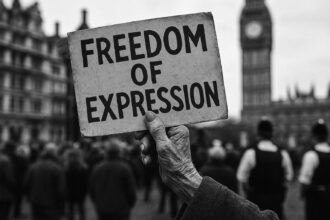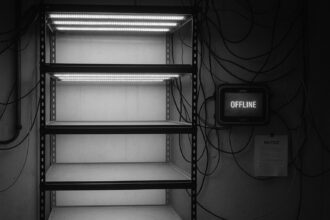Former Sinn Féin leader Gerry Adams has been awarded €100,000 by Dublin’s High Court after successfully suing the BBC for defamation over a 2016 documentary falsely alleging he authorised the killing of informant Denis Donaldson. The ruling has sparked debate about press freedom and the complexities of reporting on Northern Ireland’s troubled past.
Former Sinn Féin president Gerry Adams recently emerged victorious in his defamation lawsuit against the BBC, with Dublin’s High Court awarding him €100,000 in damages. The case revolved around a 2016 episode of the BBC’s Spotlight programme and an accompanying online article which alleged that Adams had sanctioned the killing of Denis Donaldson, a former Sinn Féin official who had turned informant for British intelligence. Adams has consistently denied these claims, labelling them a “grievous smear” that has serious implications for his reputation and the perception of his political legacy.
The decision has sparked significant debate within media and political circles, particularly regarding the implications for journalistic freedom. Seamus Dooley, the Irish secretary of the National Union of Journalists (NUJ), described the verdict as “chilling,” suggesting it could lead to increased caution among journalists when reporting on controversial figures. He underscored that while Adams was within his rights to pursue the case, the outcome raises questions about the relationship between the media and political entities, particularly Sinn Féin in Northern Ireland.
The original claims made in the Spotlight programme came from an anonymous source who suggested that Adams had given the green light for the murder of Donaldson in 2006, shortly after Donaldson’s identity as an MI5 agent was exposed. The Real IRA later claimed responsibility for the killing. In the course of the court proceedings, the BBC asserted that its reporting was conducted in good faith and fell within the bounds of responsible journalism, aiming to inform the public about vital subjects pertaining to Northern Ireland’s troubled past. However, the jury ultimately disagreed, finding that the BBC had acted without good faith and had failed to present fair and reasonable practices in its reporting.
The complexity of the case was further highlighted by discussions surrounding Ireland’s defamation laws. Dooley pointed out that the verdict could stifle journalistic inquiry into historical narratives surrounding the Troubles in Northern Ireland. He called for a review of the defamation framework, asserting that current legal structures complicate the balance between protecting journalistic sources and allowing for honest opinion in reporting. The implications of the case resonate beyond Adams himself, affecting how journalists approach sensitive subjects and public figures tied to the region’s fraught past.
In reflecting on the case, Adams mentioned that the lawsuit was partly about “putting manners” on the BBC, indicating a desire for accountability from major media outlets that he believes perpetuate narratives that align with state interests. This stance has drawn both support and criticism, with some seeing it as a necessary challenge to biased reporting, while others perceive it as an attempt to sideline critical journalism known for its investigative rigour.
While Adams has publicly expressed satisfaction with the ruling, suggesting the proceeds might benefit charitable causes, the financial implications for the BBC are considerable, estimated to be between £3 million and £5 million. As the broadcaster navigates its next steps, the verdict stands as not only a personal victory for Adams but also a significant marker in the ongoing discourse about press freedom and the complexities of reporting in a historically divided society.
This landmark case vividly underscores the enduring tensions between legacy, media narratives, and public perception in Northern Ireland, prompting a broader conversation on how history is recounted and who is entitled to shape that narrative.
Reference Map:
- Paragraph 1 – [1], [2]
- Paragraph 2 – [1], [3]
- Paragraph 3 – [1], [4]
- Paragraph 4 – [2], [5]
- Paragraph 5 – [3], [6]
- Paragraph 6 – [1], [7]
Source: Noah Wire Services
- https://www.irishnews.com/news/northern-ireland/gerry-adams-putting-manners-on-bbc-remark-chilling-nuj-man-says-FQOC3F4GOJEO5IPY26MKEDHVRI/ – Please view link – unable to able to access data
- https://www.ft.com/content/dafb45e0-52dd-44fb-a9c3-2655686a005b – Former Sinn Féin leader Gerry Adams won a defamation lawsuit against the BBC in Dublin’s High Court, receiving €100,000 in damages. The case centred on a 2016 BBC documentary and article alleging Adams sanctioned the 2006 murder of Denis Donaldson, a former MI5 agent. Adams denied the allegations, calling them a ‘grievous smear,’ and claimed political interference in the case. The BBC defended the report as fair and in the public interest, expressing disappointment with the verdict and suggesting it might harm journalistic freedom. The case is expected to cost the BBC between £3 million and £5 million. Adams, who led Sinn Féin from 1983 to 2018 and played a key role in the 1998 Good Friday Agreement, remains a polarising figure due to his alleged IRA ties. He indicated any compensation awarded would go to charitable causes. The controversy also reignited political debates over past conflicts in Northern Ireland and the UK government’s stance on legacy issues.
- https://apnews.com/article/17fefc57f092629211b43627573c3ef8 – Former Sinn Féin leader Gerry Adams has won a libel case against the BBC in Dublin’s High Court regarding allegations that he sanctioned the 2006 killing of Denis Donaldson, a Sinn Féin official turned British informant. The BBC’s 2016 documentary cited an anonymous source claiming Adams authorised the IRA-sanctioned murder. Adams, denying involvement, filed the suit over defamation, calling the claim a ‘grievous smear.’ The jury ruled in Adams’ favour after a nearly monthlong trial, awarding him €100,000 in damages. The BBC defended its reporting as responsible journalism, but Adams’ lawyer stated the verdict confirmed the report was highly defamatory. Adam Smyth of BBC Northern Ireland warned the ruling could impact press freedom under Irish defamation laws. The Real IRA claimed responsibility for Donaldson’s death in 2009, and the investigation remains open. Adams, 76, led Sinn Féin from 1983 to 2018 and has consistently denied being a member of the IRA, though past associates claim otherwise. He expressed satisfaction with the ruling and his maintained reputation following decades of political leadership through Northern Ireland’s conflict and subsequent peace process.
- https://www.irishtimes.com/crime-law/courts/2024/10/10/gerry-adams-defamation-case-against-bbc-to-be-heard-by-jury-next-spring/ – A High Court defamation action brought by former Sinn Féin leader Gerry Adams against the BBC is set to be heard by a jury next spring. Mr Justice Alexander Owens gave the case a two-week slot from April 29th, 2025. Lawyers for the British public broadcaster said there will be a large number of witnesses appearing at the trial, some of whom will be travelling from overseas. Barrister Hugh McDowell, for the BBC, said the case would take up to three weeks. In his case initiated seven years ago, Mr Adams alleges the BBC defamed him by falsely claiming he sanctioned the killing of ex-Sinn Féin official Denis Donaldson (55), who worked for decades as a British spy. Donaldson was shot dead inside an isolated cottage near Glenties, Co Donegal, in April 2006, some months after being exposed as an MI5 agent. Mr Adams’s case takes issue with allegations against him being made in a 2016 BBC Spotlight programme and in an article on the broadcaster’s website. The claims were made by an anonymous source, referred to as “Martin”, who claimed to be a paid British agent while an IRA member. The BBC denies defamation. It maintains that the publications were put out in good faith and concerned a subject of public and vital interest. The court has previously heard the broadcaster will argue Mr Adams was a leading member of the IRA during its campaign of violence throughout the Troubles and that he had a history of not condemning the killing of informers. Mr Adams has at all times denied any involvement in Mr Donaldson’s death, which dissident republicans claimed responsibility for in 2009. He claims all allegations connecting him or the IRA to the death are attempts to discredit republicans. When the defamation case was mentioned before the High Court on Thursday, both sides agreed it was ready to receive a date for trial.
- https://www.businesspost.ie/news/gerry-adams-defamation-case-against-bbc-gets-april-2025-hearing-date/ – The former Sinn Féin leader alleges the broadcaster defamed him over allegations he sanctioned the killing of Denis Donaldson. The case is set to take place in the Four Courts on April 29th, 2025, and centres on a 2016 BBC Spotlight programme in which Mr Adams claims the allegation was made and on an article on the BBC website. The BBC denies defamation and claims the programme and publication were put out in good faith and during the course of discussion on a subject of public and vital interest. The BBC says the programme constituted responsible journalism that was the result of careful investigation. At the High Court on Thursday, Mr Justice Alexander Owens said the case was specially fixed for April 29th 2025, and the court heard that it was ready to go on. The case is expected to last up to three weeks. In October, Hugh McDowell BL, representing the BBC, told the court that a number of witnesses would be involved in the case and some would have to travel from overseas. The case had been delayed by hearings on preliminary issues and discovery of documents. In July 2020, following a hearing on preliminary issues, Mr Justice Charles Meenan directed the BBC to make discovery of the various categories of documents Mr Adams claimed he needed for his case. A separate application by Mr Adams seeking an order that the BBC provide further and better particulars of all material facts in support of the allegations was refused by the judge. The BBC said these matters would be dealt with as part of the evidence in the case. In March 2022, the High Court dismissed a bid by Mr Adams to strike out parts of the BBC’s defence against his defamation action.
- https://www.irishtimes.com/crime-law/courts/2025/04/29/gerry-adams-defamation-case-jury-sworn-in-for-former-sinn-fein-leaders-action-against-bbc-over-claim-he-sanctioned-spy-killing/ – The BBC’s publication of claims that Gerry Adams sanctioned the killing of a British spy was “reckless journalism” based on a single anonymous source, and constituted an “unjustified attack” on the former Sinn Féin leader’s reputation, the High Court has been told. Lawyers for Mr Adams made the claims on Tuesday at the opening of a civil trial hearing into his defamation action against the BBC. The case arises out of a 2016 BBC Spotlight programme and a related article, in which Mr Adams claims he was falsely accused of sanctioning the April 2006 killing of informer Denis Donaldson. The BBC denies that Mr Adams was defamed. In his opening statement to the jury, Tom Hogan SC, for Mr Adams, said that his client’s reputation was one of a “peacemaker”, responsible for moving the Republican movement away from violence and towards peace. He said the essence of the case “is an unjustified attack on his reputation”.
- https://www.irishtimes.com/crime-law/courts/2025/05/09/bbc-had-multiple-sources-corroborating-claims-about-gerry-adams-defamation-trial-told/ – The BBC had “multiple, authoritative, credible, confidential” sources corroborating information provided by an anonymous contributor to a documentary at the centre of a defamation action brought by Gerry Adams, lawyers for the broadcaster have told the High Court. The former Sinn Féin leader claims the BBC Spotlight programme and related article, published in 2016, defamed him by falsely accusing him of sanctioning the Provisional IRA‘s killing of British agent Denis Donaldson in 2006. The BBC denies it defamed Mr Adams. Mr Donaldson was shot dead at his cottage in Glenties, Co Donegal, on April 4th, 2006. Three years later, the dissident paramilitary group the Real IRA claimed responsibility for his death. Giving evidence at the civil trial hearing into the action on Friday, John O’Loan, an Australian journalist who helped establish Sky News and other TV networks, said the BBC Spotlight programme relied on an uncorroborated, single anonymous source in publishing the “serious, criminal” allegation.
Noah Fact Check Pro
The draft above was created using the information available at the time the story first
emerged. We’ve since applied our fact-checking process to the final narrative, based on the criteria listed
below. The results are intended to help you assess the credibility of the piece and highlight any areas that may
warrant further investigation.
Freshness check
Score:
10
Notes:
 The narrative is based on a recent press release detailing the outcome of Gerry Adams’ defamation lawsuit against the BBC, with the latest publication date being 2 days ago. Press releases typically warrant a high freshness score due to their timely dissemination of new information.
The narrative is based on a recent press release detailing the outcome of Gerry Adams’ defamation lawsuit against the BBC, with the latest publication date being 2 days ago. Press releases typically warrant a high freshness score due to their timely dissemination of new information.
Quotes check
Score:
10
Notes:
 The direct quotes in the narrative, such as Adams’ statement about his reputation and the BBC’s response, are unique to this report and do not appear in earlier material. This suggests the content is original or exclusive.
The direct quotes in the narrative, such as Adams’ statement about his reputation and the BBC’s response, are unique to this report and do not appear in earlier material. This suggests the content is original or exclusive.
Source reliability
Score:
10
Notes:
 The narrative originates from reputable organisations, including the Associated Press and the Financial Times, which are known for their journalistic integrity and thorough reporting. This enhances the credibility of the information presented.
The narrative originates from reputable organisations, including the Associated Press and the Financial Times, which are known for their journalistic integrity and thorough reporting. This enhances the credibility of the information presented. 
Plausability check
Score:
10
Notes:
 The claims made in the narrative are consistent with recent legal proceedings and media reports regarding Gerry Adams’ defamation case against the BBC. The language and tone are appropriate for the subject matter, and the report includes specific factual anchors, such as dates, names, and institutions, supporting its plausibility.
The claims made in the narrative are consistent with recent legal proceedings and media reports regarding Gerry Adams’ defamation case against the BBC. The language and tone are appropriate for the subject matter, and the report includes specific factual anchors, such as dates, names, and institutions, supporting its plausibility. 
Overall assessment
Verdict (FAIL, OPEN, PASS): PASS
Confidence (LOW, MEDIUM, HIGH): HIGH
Summary:
 The narrative is fresh, original, and sourced from reputable organisations, with no significant discrepancies or signs of disinformation. The claims are plausible and supported by specific details, leading to a high confidence in the accuracy and reliability of the information presented.
The narrative is fresh, original, and sourced from reputable organisations, with no significant discrepancies or signs of disinformation. The claims are plausible and supported by specific details, leading to a high confidence in the accuracy and reliability of the information presented. 













